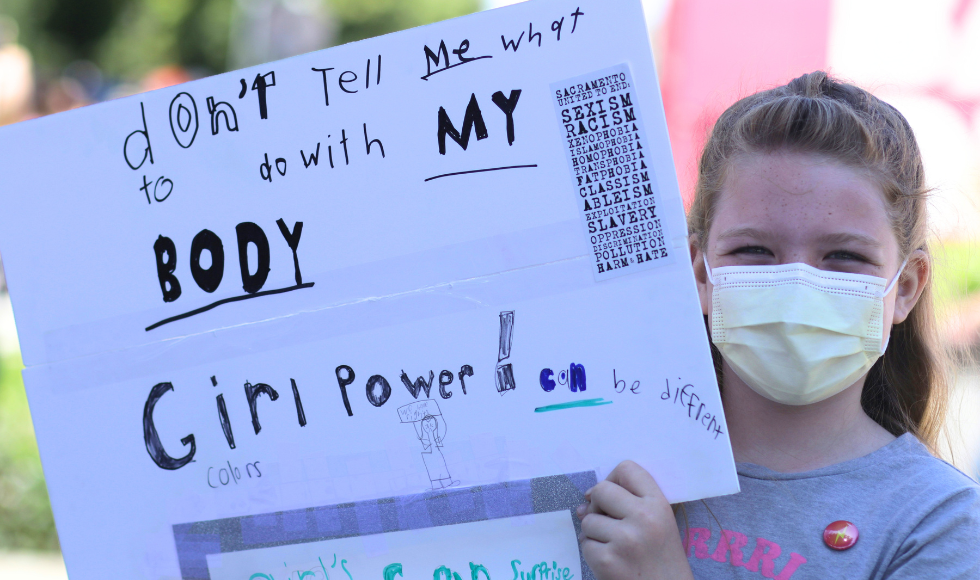Analysis: Girls are the leaders of today, not just the future

Girls are profoundly aware of gender, race, class and climate injustice and are working hard to create change with the resources they have, writes PhD candidate Alexe Bernier. (Unsplash photo)
BY Alexe Bernier
March 7, 2024
 Social work PhD candidate Alexe Bernier is doing research with young girls involved in activism. She contends that, rather than seeing them as the leaders of tomorrow, we should listen to them now. In this piece for International Women’s Day 2024, Bernier writes about her experiences.
Social work PhD candidate Alexe Bernier is doing research with young girls involved in activism. She contends that, rather than seeing them as the leaders of tomorrow, we should listen to them now. In this piece for International Women’s Day 2024, Bernier writes about her experiences.
International Women’s Day (IWD), celebrated on March 8, is a chance to recognize the achievements of women across society. Born out of the Lawrence Textile strike in 1912, the day serves as an opportunity to reflect upon the power of collective action in the quest for equity and social justice.
Honouring the histories behind IWD reminds us of the significant and hard-fought gains towards gender equity over the past century. Now, as we look towards the future, these histories give us hope for what might be possible in the fight for true equity.
Sites of hope, however, aren’t just found in looking towards the future: There is also plenty of hope right here in the present.
I am a former community social worker and now PhD candidate in the School of Social Work at McMaster. My work is centred around platforming the activist work of young girls, honouring the many ways that they are working to making our worlds better.
When I was a social worker in Calgary, I worked with girls between the ages of 10 and 18 to develop and strengthen their leadership and activism skills. I saw first-hand the power of girls as they challenged sexist school dress code policies, attended #FridaysForFuture protests to demand climate action, and advocated to change the name of a school that was originally named after one of the architects of residential schools.
Witnessing the ways that girls are striving to create social and environmental change ultimately inspired my doctoral research. In the fall of 2023, I learned from nine girls ages eight to 12 years old about the ways that they are working to make our worlds better, which included involvement in political campaigns, signing petitions, picking up garbage to combat pollution, and challenging sexist stereotypes through critical conversations with peers, family, and teachers.
Despite all of the important work that they do to create change in our social, cultural, and political worlds, girls are often overlooked as meaningful agents of change.
We think of girls as leaders of the future, failing to recognize that they are also leaders of the now.
There are many reasons why we might not see or take seriously girls as leaders of the present. One of which, however, (and one that I am particularly interested in through my doctoral research), are the perceptions that we — adults — tend to have about what girls can and should be doing.
When we think about girls, we might think of pink, frivolity, and fun. Girlhood (and, specifically, white girlhood) is often framed as a time of inherent innocence, and we like to think that girls maintain a blissful obliviousness about the world around them until they reach teenager or adulthood.
My experiences working with girls, however, proves otherwise.
The many girls that I have had the honour of knowing and working with are profoundly aware of the deeply political nature of girlhood, and are quick to identify gender, race, class, and climate injustice that happens in their worlds.
Aligned with the original roots of IWD, they are working hard to create change with the resources that they have so that we can collectively experience more equitable, sustainable, and safe presents and futures.
While girls know that there are things in the world that need changing, they also know that they are limited in what they can do because they don’t have the same resources or power that adults do.
As we celebrate this IWD, I urge you to turn towards the girls in your communities and look to them for leadership on climate, gender, race, and disability justice.
If we listen to them intently, take them seriously, and support them in ways that we can, we will quickly see that girls aren’t just leaders of the future. Girls are leaders of the now.


